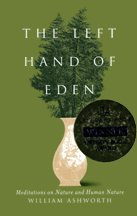
The Left Hand of Eden
William Ashworth
**Literary Arts Winner Oregon Book Award**
This important contribution to the growing debate over the protection of wilderness areas comes from an unusual perspective — that of an environmentalist arguing against preservation.
A longtime activist, William Ashworth grew frustrated with the environmental movement and its efforts to preserve wilderness. In this provocative book he explores "the disharmony that exists between the laws of nature and the laws we use to protect it." Ashworth argues that wilderness preservation is a form of separation from the land and, as such, is as harmful to nature as logging or mining. Treating nature as something "other" — whether to preserve it or destroy it — creates a false dichotomy, from which all modern environmental battles arise: use versus preservation, civilization versus wilderness.
Ashworth presents his bold and original ideas in a series of linked nature essays. In these powerful, poetic writings he shows that proper care for the land requires not just use or reverence, but use with reverence. "Careful use of resources is the key to preserving them," he writes. "It not only works: it is the only thing that ever has."
About the author
William Ashworth is the author of numerous books on the environment and natural history, including The Economy of Nature, The Late, Great Lakes, and The Wallowas: Coming of Age in the Wilderness, a volume in the Oregon State University Press Northwest Reprints series. He lives in Ashland, Oregon.
Read more about this author
Prologue
I. The Undiscovered Journey
A Death at Sunset
Witnesses to the Creation
The Undiscovered Journey
II. The Enemy of Progress
The Lone and Level Sands
The Butterfly's Wing
The Thing He Loves
The Enemy of Progress
Hopeful Monsters
On the Edge
III. The Left Hand of Eden
Thoreau's Doormat
Spotting the Owl
The Left Hand of Eden
Down the River
Acknowledgements
Notes on Sources
"Forthright, lucid, and as in love with the universe as his heroes."
"Ashworth's prose is as poetic as it is informative and insightful, and life a good poet, Ashworth never once settles for the easy conclusion. This is as inviting and provocative a read as I have encountered in a long time."
